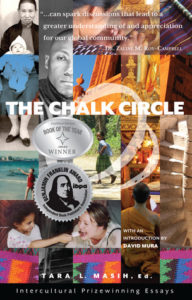 Review by Christina Mock
Review by Christina Mock
– Tara Masih’s The Chalk Circle is a superb collection of essays that moves the reader outside of their comfort zone. These award winning writers cover a wide range of topics which raise questions about war, violence, forgiveness, racism, love, innocence, and ultimately, what it means to be human. While reading this collection, I could not help but become attached to the characters I met whether it was Shanti Elke Bannwart, in search of peace for her father’s crimes as a Nazi or Samuel Autman, the only African American man working on a newspaper in Utah who deals with racism on a regular basis. The Chalk Circle started a conversation with me which continued to resonate long after I finished reading the collection.
In “Tongue-Tied” by Kelly Hayes-Raitt she makes war personal and brings it closer to home through her encounter with the child Nebras, “I hug her harder than I intended. I feel her wiry hair against my cheek, her grungy T-shirt against my shoulder, her warm, open heart so willing to accept mine.” (59). Through the physicality of descriptions, Hayes-Raitt brings Nebras to life. I felt connected to this child that I have never met. Instead of imaging a faceless girl growing up in a war zone in Iraq, I see her wiry hair, open heart, and willingness to be loved. I see pieces of her in the children that I am surrounded by and know that she is one of many whose life has been touched by the chaos of war. I wonder about Nabras’s daily life in Iraq, whether she has a safe place to sleep and how she deals with fear.
The reader gets a glimpse of daily life in Guatemala from the perspective of the visitor and the local in Gretchen Brown Wright’s “Triptych: Paradise.” When the bungalow door to Wright’s room is discovered open with the possibility of burglary, she responds, “The tranquility here has lulled me into thinking this might be paradise. But we are humans, incapable of living in paradise.” (133). In addition to shedding light on this human flaw, Wright’s language and perspective of the country reflect that of the visitor, the native English speaker, and differs from Maria’s perspective of Guatemala “We live like this always here in Guatemala. We never relax. We are always a little bit afraid.” (135). The beauty that I associate with a paradise sharply contrasts the conditioned fear Maria experiences. The complicated Guatemala shown through these perspectives is one that took me time to get used to and even now, I cannot fully grasp the idea of living in constant fear. The country I live in has violence, theft, and many other dangers, but moments of fear are temporary and fleeting.
In these two essays, as well as the rest of the collection, the trials and dreams of these writers and the people and places they are writing about come to life. Their struggles became personal for me as I worked my way through their stories. Whether reading purely for pleasure or for academic means, The Chalk Circle will leave you with a greater perspective of society’s history and future. In addition to the issues these writers address, the probing questions at the end of the collection provide topics for discussion which had me going back for a more in-depth read. Through the journeys of these writers, these essays enable the reader to study the diversity of the world and come to a better understanding of the lives of those who came before us, the modern world beyond our borders, and provide a glimpse of our future.
The Chalk Circle: Intercultural Prizewinning Essays
By Tara L. Masih, Ed.
Wyatt-MacKenzie Publishing, Inc.
220 Pages
Christina Mock graduated from the Stonecoast MFA program in Creative Writing at the University of Southern Maine. Her poems have appeared in Cabildo Quarterly, About Place Journal, and Red Rock Review. She is currently living and teaching in Texas.
